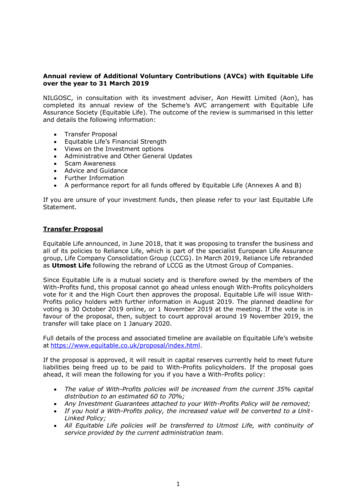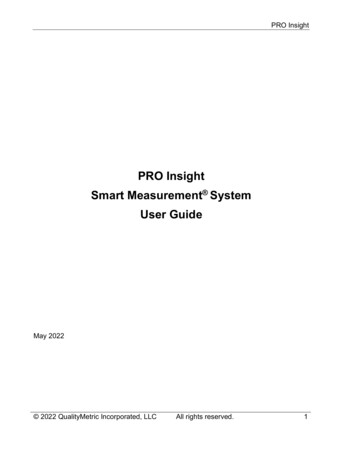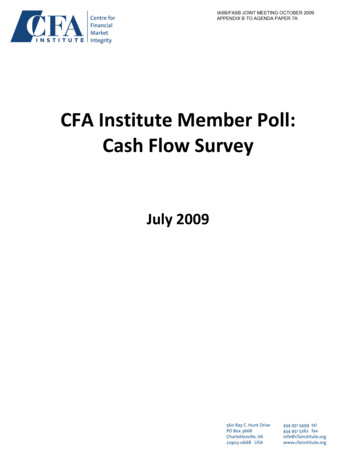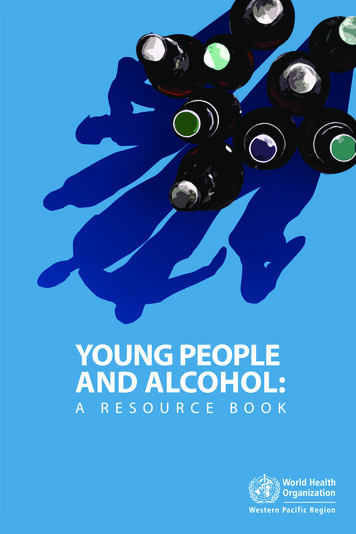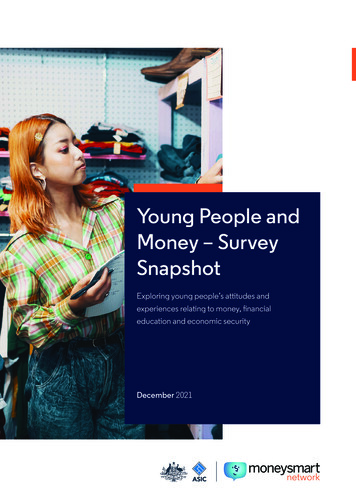
Transcription
Young People andMoney – SurveySnapshotExploring young people’s attitudes andexperiences relating to money, financialeducation and economic securityDecember 2021
Understanding the financial lives of youngpeople in AustraliaYoung people face unique financial challenges as they complete their schooling and transition intoadulthood. Financial decisions become more complex and significant. Many young people get a job, makelarge purchases, enter into contracts, take out loans, apply for credit and pay rent and utility bills for the firsttime. Youth is is an important period to lay the foundations for a successful and secure financial future andearly education and intervention are can be key to preventing poor financial choices in later years.To better understand the challenges young people are facing, as well as their experiences, attitudes andbehaviours across a range of money-related topics, the Australian Securities and Investments Commission(ASIC) conducted two Young People and Money surveys. The first survey of 1,514 young Australians(aged 15-21 years) was conducted online in July 2020. A subsequent survey of 1,521 15-21 year olds wasconducted online in February-March 2021. 1The survey responses provide new insight into how young Australians learn about, engage with and feelabout their finances. The findings point to the important role families, the education sector, government,employers, financial institutions and other organisations play in supporting young people’s financialwellbeing. They highlight factors that could promote improved financial confidence and knowledge amongyoung Australians, as well as areas where improvements could be made.KEY FINDINGS1. Young people think strategically about money, but their feelings also influence behaviour2. Young people are engaging with the financial system and want to learn more aboutmanaging money3. Young people rely on diverse sources of information and education4. Geography and gender affect young people’s reported financial education5. The pandemic environment has impacted young peoples’ financial outlook1For each survey, respondents were recruited through an online survey panel, both directly and via parents and guardians.Consent was sought from parents and guardians of 15 year olds before the young person was invited to take part inthe survey. All respondents who chose to participate in the survey were informed that they were free to withdraw theirparticipation at any time.Quotas were used to ensure a representative sample based on age, gender, state/territory and metropolitan/regional status. Weighting was further applied based on Australian Bureau of Statistics population estimates to ensurerepresentativeness of results.Testing has been undertaken to determine the statistical significance of any differences noted across cohorts. Alldifferences identified in this report are statistically significant at the 95% confidence level, except where otherwise noted.December 2021 Young people and money survey2
1. Young people think strategically about money,but their feelings also influence behaviourYoung people are actively saving and planning for the futureWhen asked about their top money priorities, saving was overwhelmingly the top response given by youngpeople. Around 8 in 10 young people (81%) indicated having a savings goal, with a quarter (25%) indicatingthat this was a long term goal (i.e. a goal they anticipated reaching in more than 24 months).‘‘I really just want to save as much as I can, so thatin the future I won’t be struggling. I’m planning onsaving for a car within the next couple of months andhopefully soon I can start saving a big amount for adeposit on my own house.’Female 19 years oldWhile only around one third of young people agreed or strongly agreed that they were aware of how muchmoney they’ll need to save for retirement (31% overall), over half agreed or strongly agreed that ‘I wouldprefer to sacrifice a bit of spending now to know I’ll have enough money in retirement’ (54%).Young people are using new payment methods such as Buy-Now Pay-Later to manage cashflowand as a means to purchase goods they otherwise couldn’t affordYoung people are engaging with new payment methods, with 46% indicating that they have used Buy-NowPay-Later services. When asked why they use these services, key themes in the responses included:xNot having enough money/cash available at the time of making a purchasexSpreading payments out over time thereby making them easier to meet/more achievablexThe immediacy of getting an item when in need.While it was evident from young people’s responses that some are using Buy-Now Pay-Later services as astrategic tool to manage their money (e.g. to fall within weekly spending and saving targets they have set),31% of Buy-Now-Pay-Later users indicated that they had bought something they really couldn’t afford orstruggled to pay off later just because there was a Buy-Now-Pay-Later option available.‘‘I can own things I need the most, even when I don’thave the full amount to pay. It helps to purchasethings in an easy way but at the same time increasesthe liability.’December 2021 Young people and money surveyMale 21 years old3
Some young people struggle to make good online spending decisions‘‘I ordered something online that was meant to be“free” and we just had to pay for shipping. A fewmonths later I got an email from them saying that Ineed to pay for it and apparently it was only free fora while and you had to pay afterwards. I lost like 80bucks for a box worth like 5 bucks.’Female 16 years oldYoung people now shop online more than ever before. They make international transactions (with orwithout their knowledge) and potentially commit to ongoing payments with the click of a button.The survey asked young people if they had experienced a situation where they felt ripped off, takenadvantage of financially or didn’t understand what something would cost them until it was too late.Over one fifth (22%) of respondents reported having had such an experience.Among these respondents, experiences included:xIncurring hidden costs when purchasing goods or servicesxSigning up for ‘free’ products or trial subscriptions that turn into paid commitmentsxS hopping on ‘scam’ websites where the products that they paid for did not live up toexpectations around quality or were never delivered at all.Feelings about money can influence young people’s wellbeing and spending behaviour‘‘I find that worrying about money at a young agecan really impact mental wellbeing and can placea constant toll on a person. However, managingmoney from a young age is a good learning processfor the future as I am more confident that I will beable to budget and control my spending.’Female 15 years oldDecember 2021 Young people and money survey4
Many young people believe good financial decisions have a positive association with wellbeing, whilefeeling up or down can affect spending behaviour:x wo thirds of young people (67%) agreed or strongly agreed with the statement that ‘making goodTfinancial decisions improves my mental health/wellbeing’.x round half (51%) of all young people agreed/strongly agreed with the statement ‘I often feelAstressed about money’.xAround 4 in 10 (39%) agreed or strongly agreed that ‘spending money makes me feel good’.x3 in 10 (30%) agreed or strongly agreed that ‘when I’m feeling down or anxious I tend to spendmore money’.As is evident in Figure 1, greater proportions of females than males agreed with the majority of thesestatements.Figure 1: Reported gender differences in young people’s emotional relationship with money 270%Making good financial decisionsimproves my mental health/wellbeing64%59%I often feel stressed about money43%40%Spending money makes me feel good38%35%When I’m feeling down or anxiousI tend to spend more entage of respondents who strongly agree/agreeAll gender differences presented in Figure 1 are statistically significant at the 95% confidence level, except results for‘Spending money makes me feel good’.2December 2021 Young people and money survey5
2. Young people are engaging with the financialsystem and want to learn more aboutmanaging moneyYoung people are keen to build their financial knowledge‘‘I'd really like to know more about how to get startedinvesting and how to file taxes when you're earningpocket money from things like selling on eBay, andI've had difficulty finding such information.’Female 20 years oldThe surveys revealed high levels of interest from young people in learning more about money. Youngpeople expressed a strong desire to learn more about a wide range of financial topics, through a range ofsources.Specifically, more than half of all respondents reported wanting to learn about:xHow to invest money – ways to invest, types of investments and possible risks and returns (57%)xHow to save money (57%)xHow to file a tax return (54%)xHow to manage money well and not waste it (54%)xHow to set financial goals and achieve them, e.g. buying a car or a property (52%)xHow to live out of home independently (52%).Young people are keen to investSurvey results also indicated that a sizeable proportion of young people are seeking to build wealththrough investing, with one in four young people (25%) reporting at least one investment. This proportionwas significantly higher among males (35%) than among females (16%).‘‘You have got to invest if you want to have acomfortable financial future.’December 2021 Young people and money surveyMale 20 years old6
The types of investments young people most commonly reported holding were:xShares (14%)xTerm deposit (7%)xBitcoin/cryptocurrency (6%)xProperty (3%)Young people with investments appear to be highly engaged in tracking progress of their main investment,with over half (53%) monitoring their investments at least weekly, 15% reviewing fortnightly, 14% reviewingmonthly, and 14% reviewing occasionally/infrequently. A small minority (only 3%) never review how theirinvestment is tracking.There is an opportunity to help young people learn about superannuationThere is an appetite among many young people to learn more about superannuation and to beginaccumulating it, with 62% agreeing or strongly agreeing that ‘I think it’s important to start building up mysuperannuation while I’m young’.The survey results suggest a lack of awareness among some young people around aspects of theirsuperannuation:x9 % of young people didn’t know if they had a super account, while a further 17% knew that theyhad an account but didn’t know the name of their fund.x f those currently working,16% were unaware of whether or not they were earning super andOfewer than half (44%) remembered being offered a choice of super fund by their employer whenstarting their most recent job.Moreover, when those with a super account were asked what influenced their choice of fund, the topresponses suggested that the level of engagement in the topic was unsophisticated:1.It’s my employer’s default fund (38%)2.Recommended by a parent/family member (23%)3.It’s the fund for my industry (14%)4.I didn’t care which fund I went with (12%)December 2021 Young people and money survey7
3. Young people rely on diverse sources ofinformation and educationFamilies play a critical role in establishing a firm foundation for young people’s financial futures‘‘My parents are very thrifty and have taught me howto buy well and to make money even if you don'thave very much to begin with. Barely any of myfriends know how to do this or how to actually makemoney when broke.’Female 16 years oldThe results suggest that young people who report growing up in households where they have learningexperiences about money, including family discussions about financial matters, feel more confident abouttheir financial skills, decision making and future financial prospects than young people whose families donot have these discussions (see Figure 2).Figure 2: F inancial attitudes among young people who grew up in a household where family financial matterswere discussed compared to those who did not39%I feel very comfortable dealing withbanks and other financial institutions52%50%I feel confident about the financialdecisions I make61%53%I am good at dealing with day to dayfinancial matters62%54%I am confident that I will be financiallysecure in adult life64%57%I will achieve the financial goals that Ihave set for myself66%0%10%20%30%40%50%60%70%80%Percentage of respondents who strongly agree/agreeGrew up in a household where family financial matterswere not discussedDecember 2021 Young people and money surveyGrew up in a household where family financial matterswere discussed8
While parents remain the main source of advice, some young people are turning to ‘finfluencers’‘‘I was told [by a YouTuber] that starting to save andlearning the value of money young will make all thedifference you need.’Female 18 years oldParents and guardians come out on top when young people are asked about:xWho they speak to about money (80% citing parents/guardians)x ho they feel most comfortable talking about money with (81% saying they feel very comfortable/Wcomfortable talking with a parent or guardian about money)xHow they would most like to learn about money (77% indicating ‘from my parent/guardian’)x Who they have received the best piece of financial advice from (67% indicating this was from a parent)xI f applicable, what factors have influenced their choice of where to invest their money/what type ofinvestment to make (with 45% citing advice from a parent/family member).‘‘My father has been a great help, I think childrenshould ask their parents more about their personalexperiences with finance.’Male 17 years oldHowever, the survey results suggest that the role of social media personalities (financial influencers or‘finfluencers’) should not be overlooked, with 28% of young people indicating that they follow at least onefinfluencer on social media. When asked who they follow, young people cited a wide range of individuals,with the top three categories being entrepreneurs, ‘financial popstars’ and celebrities (including actors,tv personalities, musicians, gamers and elite sportspeople). Of those who follow a finfluencer, almost twothirds (64%) reported having changed at least one of their financial behaviours as a result.December 2021 Young people and money survey9
Young people want more financial education at school, with a focus on practical, real-lifemoney management topics‘‘I think in schools, learning about money isexclusive to finance-related subjects, such ascommerce, but it could be included in othersubjects or have its own subject.’Female 15 years oldThe survey found that fewer than two in ten (18%) young people reported feeling they had learnt enoughabout how to manage money at school. Three in ten young people indicated that what they learn(t) aboutmoney/financial matters at school was not very useful (20%) or not at all useful (9%). Four in ten youngpeople (40%) indicated that what they learn(t) about money at school was only somewhat useful.3Young people also rely on their employers for financial education and informationWhether learned at school or in the workplace, there are fundamental skills that all young people require tosuccessfully navigate employment and its associated financial implications. Among those currently working,the top three topics young people reported employers have spoken with them about are:xYour rights as an employee (64%)xHow to obtain a tax file number (54%)xHow to understand a payslip (54%)‘‘My manager told me to open a savings account.This backed me up really well and helped me intimes with low money.’Male 21 years oldThe majority of young people (84%) were interested in learning from their employer about at least one ofthe financial topics listed in the survey, with particular interest expressed in learning about their rights as anemployee (51%), how to understand a payslip (37%), choosing a super fund (37%) and investing money inshares or property (36%).3 Note: Results exclude those who answered ‘not applicable’.December 2021 Young people and money survey10
4. Geography and gender affect young people’sreported educationLocation impacts the reported experience and perceived usefulness of financial educationreceived in schools by young peopleAcross the survey responses, differences in reported financial education experiences were apparentbetween young people living in metropolitan and regional and rural areas. While still a minority, a higherproportion of young people living in metropolitan areas indicated they learnt about how to manage moneyat school, compared to those living in non-metropolitan areas (37% compared to 31%). A higher proportionof young people living in non-metropolitan areas indicated that what they learnt at school was not very ornot at all useful (37% compared with 26% of metro respondents).4There is a gender divide relating to financial education, confidence and concernsDifferences were apparent in male and female experiences of financial education, at home, in theclassroom and in the workplace (see Figure 3).Figure 3: Reported gender differences in young people’s financial education were discussed compared tothose who did notFamily discussed family financialmatters with you while growing upat home59%65%Provided with a regular allowance orpocket money while growing upat home60%68%33%Learnt about how to manage moneyat school38%30%Employer has spoken to you about theimportance of saving*46%Employer has spoken to you abouthow to obtain a tax file number*50%59%Employer has spoken to you aboutchoosing a super fund*36%43%Employer has spoken to you aboutmaking additional voluntarycontributions to your super*19%29%17%Employer has spoken to you aboutinvesting money, for example in sharesor Percentage of respondents who strongly agree4 Note: Results exclude those who answered ‘not applicable’.* Note: Employer questions were asked only of young people with current employment.December 2021 Young people and money survey11
Gender differences were also observable in financial attitudes, confidence (see Figure 4) and concerns.This was evident both across topics that young males and females are keen to learn more about, and intheir preferred modes of learning delivery.Figure 4: Gender differences in financial confidence (percentage of respondents who strongly agree/agreewith the following statements)‘I feel confident with the financial decisions I make’60%of males54%of females‘I feel very comfortable dealing with banks and other financial institutions’53%of malesDecember 2021 Young people and money survey42%of females12
5. The pandemic environment has impactedyoung peoples’ financial outlookCOVID-19 has impacted young people and their financesThe surveys revealed that sizeable proportions of young people are harbouring concerns about theirfinancial situation, both now and into the future.xI n 2021, only half of young people agreed or strongly agreed with the statement ‘I am confidentthat I will be financially secure in adult life’ (51%, down from 60% in 2020).x ven fewer agreed or strongly agreed that ‘I am comfortable with my financial situation at theEmoment’ (40%, down from 49% in 2020).There were some important gender differences, with a lower proportion of females than males agreeingor strongly agreeing with each of these statements (see Figure 5). Fewer than half of females in the mostrecent survey indicated feeling confident they would be financially secure in adult life, while only just overone third reported being comfortable with their financial situation currently.Figure 5: Gender differences in perceived financial security (percentage of respondents who strongly agree/agree with the following statements, 2021 survey results)‘I am confident that I will be financially secure in adult life’56%of males46%of females‘I am comfortable with my financial situation at the moment’44%of malesDecember 2021 Young people and money survey35%of females13
Some young people’s earnings have gone down as a result of their circumstances in the pandemic, whichappears to be having a flow-on effect on savings:x ore than 1 in 3 (36%) young people reported a decrease in earnings, 18% of young peopleMreported an increase, while 41% said their earnings have remained about the same.x he same proportion (36%) of young people reported a decrease in savings over this period.TConversely, 25% of young people reported an increase in savings, while 35% said their savingshave remained about the same.‘‘‘COVID-19 resulted in me losing 2 jobs and I wasnot eligible for any COVID payments therefore myrelationship with money changed over the year and Ihave become more stressed about it.’Female 20 years oldCOVID-19 has reinforced the importance of a ‘safety net’COVID-19 has taught us to save money for thefuture, anything can happen at any time.’Male 20 years oldWhen asked what they have to fall back on/rely on if they face a financial challenge or a largeunexpected expense:xAround 6 in 10 (59%) said they had personal savings to fall back onxHalf (50%) of young people reported that they could rely on financial support from familyx7% indicated they had financial support from a partner as a back-upx6% indicated they’d turn to a credit cardx1% suggested another safety net.Importantly, one in eight young people (12%) said they had none of the above to fall back on if theyfaced afinancial challenge.For more information about young people’s financial lives see our Young people and money report.5 Note: Results exclude those who answered ‘not applicable’.December 2021 Young people and money survey14
‘COVID-19 has taughtus to save money forthe future, anythingcan happen at anytime.’Male 20 years old
Female 16 years old Young people now shop online more than ever before. They make international transactions (with or without their knowledge) and potentially commit to ongoing payments with the click of a button. The survey asked young people if they had experienced a situation where they felt ripped off, taken






